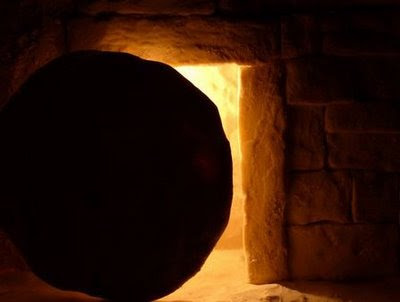
Listen to an audio version of this post at
http://media1.imbresources.org/files/108/10821/10821-57827.mp3
The resurrection of Christ is the central event of human history.
Because He lives, everything has changed for those who believe and follow Him. We have salvation and hope — and we share them with others. We celebrate His victory over sin and death. We look toward eternity with joyful expectation, not fear or despair.
So where is He? Everywhere — even in dark places. Especially in dark places. If you watch and listen, you will witness some of the countless, quiet epiphanies that reveal His risen presence. Here are a few:
-- Because of government restrictions in a country hostile to Christians, a church meets on a patch of land 6 feet wide and 30 feet long — no roof, no floor — jammed into a narrow space between a believer’s house and a neighbor’s wall. The preacher stands under a tree at one end. The congregation stretches back for the length of the house and spills into the front yard.
“When it rains everyone gets wet. When the sun shines they all get tanned. But when they praise the Lord, they are all blessed,” says a missionary. “And so were we the night we worshipped with them.”
-- A former missionary struggles with an aggressive form of cancer. He already has lost a leg to a malignant tumor. More treatment looms. He admits that his life seems very fragile at the moment. Yet God continues to use him to bless others.
Recently he visited the renowned Mayo Clinic in Rochester, Minn., for medical tests. That afternoon, “I sat down at the grand piano in the main lobby and played for an hour,” he writes. “It was therapy for my soul. I played improvisations on various hymns including Fairest Lord Jesus, It is Well with My Soul and What a Friend We Have in Jesus. I shed a few tears as I thought back on memories of my past … of holidays when our children were small and would dance around the living room to my music.”
Later, as he waited in the lobby, a woman in a volunteer uniform sat down in a chair next to him. “Excuse me, but I wanted to let you know that God used your gifts today to touch someone in a deep way,” she said. “I recognized every song you played, and I must say I have never had a worship experience like I did today. Thank you.”
-- A staunch Buddhist woman in East Asia faithfully burned incense for her deceased parents. Many Christians had tried to share the Good News of Easter with her, but she had rejected it — and even cursed the messengers. One day a massive earthquake destroyed her village, taking her home and family. During one of the long nights of despair that followed, she dreamed of a wordless book of colors falling from heaven.
Early the next morning, some strangers visited the refugee camp where she was living. When one of them took out a book of colored pages, she quickly invited them into her tent. As they shared the Gospel, using colors to explain the way to salvation, she knew that God had sent them. She immediately repented of her sins and received Christ into her heart. Now she too serves in a disaster relief zone, telling others about the love of God.
-- Two dozen volunteers from Kingsland Baptist Church in Katy, Texas, helped a single mother make repairs around her home. A neighbor saw the activity and walked across the street to ask what they were doing. A volunteer explained that the single mom was experiencing tough times and didn’t have the money to pay for house repairs.
“We’re here to demonstrate God’s love to this woman by meeting some of her needs,” the volunteer said.
The neighbor scratched his head and replied, “I’m not a Christian, and I’ve never had a desire to go to any church. I never realized Christianity was about stuff like this — helping those in need. If that’s what it’s about, I’m interested in learning more about Jesus.”
-- On my own street, a young man dropped out of high school a few years ago to drink, take drugs and hang out with gang members. But recently he changed his ways. He has a new friend: Jesus. Through counseling, reading the Word of God and prayer, he’s realizing that he doesn’t need alcohol to make it through the day, doesn’t need pills to calm down, doesn’t need to break the law to be “accepted” by others. Christ is all he needs now, and all he wants. His eyes light up when he talks about his newfound freedom from fear, anxiety and anger.
Small moments. Little Easters, you might say. They seldom make the news — except in heaven.
He is risen.
http://media1.imbresources.org/files/108/10821/10821-57827.mp3
The resurrection of Christ is the central event of human history.
Because He lives, everything has changed for those who believe and follow Him. We have salvation and hope — and we share them with others. We celebrate His victory over sin and death. We look toward eternity with joyful expectation, not fear or despair.
So where is He? Everywhere — even in dark places. Especially in dark places. If you watch and listen, you will witness some of the countless, quiet epiphanies that reveal His risen presence. Here are a few:
-- Because of government restrictions in a country hostile to Christians, a church meets on a patch of land 6 feet wide and 30 feet long — no roof, no floor — jammed into a narrow space between a believer’s house and a neighbor’s wall. The preacher stands under a tree at one end. The congregation stretches back for the length of the house and spills into the front yard.
“When it rains everyone gets wet. When the sun shines they all get tanned. But when they praise the Lord, they are all blessed,” says a missionary. “And so were we the night we worshipped with them.”
-- A former missionary struggles with an aggressive form of cancer. He already has lost a leg to a malignant tumor. More treatment looms. He admits that his life seems very fragile at the moment. Yet God continues to use him to bless others.
Recently he visited the renowned Mayo Clinic in Rochester, Minn., for medical tests. That afternoon, “I sat down at the grand piano in the main lobby and played for an hour,” he writes. “It was therapy for my soul. I played improvisations on various hymns including Fairest Lord Jesus, It is Well with My Soul and What a Friend We Have in Jesus. I shed a few tears as I thought back on memories of my past … of holidays when our children were small and would dance around the living room to my music.”
Later, as he waited in the lobby, a woman in a volunteer uniform sat down in a chair next to him. “Excuse me, but I wanted to let you know that God used your gifts today to touch someone in a deep way,” she said. “I recognized every song you played, and I must say I have never had a worship experience like I did today. Thank you.”
-- A staunch Buddhist woman in East Asia faithfully burned incense for her deceased parents. Many Christians had tried to share the Good News of Easter with her, but she had rejected it — and even cursed the messengers. One day a massive earthquake destroyed her village, taking her home and family. During one of the long nights of despair that followed, she dreamed of a wordless book of colors falling from heaven.
Early the next morning, some strangers visited the refugee camp where she was living. When one of them took out a book of colored pages, she quickly invited them into her tent. As they shared the Gospel, using colors to explain the way to salvation, she knew that God had sent them. She immediately repented of her sins and received Christ into her heart. Now she too serves in a disaster relief zone, telling others about the love of God.
-- Two dozen volunteers from Kingsland Baptist Church in Katy, Texas, helped a single mother make repairs around her home. A neighbor saw the activity and walked across the street to ask what they were doing. A volunteer explained that the single mom was experiencing tough times and didn’t have the money to pay for house repairs.
“We’re here to demonstrate God’s love to this woman by meeting some of her needs,” the volunteer said.
The neighbor scratched his head and replied, “I’m not a Christian, and I’ve never had a desire to go to any church. I never realized Christianity was about stuff like this — helping those in need. If that’s what it’s about, I’m interested in learning more about Jesus.”
-- On my own street, a young man dropped out of high school a few years ago to drink, take drugs and hang out with gang members. But recently he changed his ways. He has a new friend: Jesus. Through counseling, reading the Word of God and prayer, he’s realizing that he doesn’t need alcohol to make it through the day, doesn’t need pills to calm down, doesn’t need to break the law to be “accepted” by others. Christ is all he needs now, and all he wants. His eyes light up when he talks about his newfound freedom from fear, anxiety and anger.
Small moments. Little Easters, you might say. They seldom make the news — except in heaven.
He is risen.
